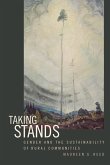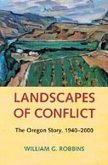The Canadian prairies are often envisioned as dry, windswept fields; however, much of southern Manitoba is not arid plain but wet prairie, poorly drained land subject to frequent flooding. Shannon Stunden Bower brings to light the complexities of surface water management in Manitoba, from early artificial drainage efforts to late-twentieth-century attempts at watershed management. She engages scholarship on the state, liberalism, and bioregionalism in order to probe the connections between human and environmental change in the wet prairie. This account of an overlooked aspect of the region's environmental history reveals how the biophysical nature of southern Manitoba has been an important factor in the formation of Manitoba society and the provincial state.
Hinweis: Dieser Artikel kann nur an eine deutsche Lieferadresse ausgeliefert werden.
Hinweis: Dieser Artikel kann nur an eine deutsche Lieferadresse ausgeliefert werden.








